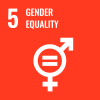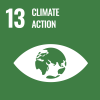Santa Teresita Indigenous Community, Paraguay – Ilaria lives with her four children and her mother in a remote part of the Mbya Guarani indigenous territory in Santa Teresita, Paraguay, where she faces the harsh realities of being a single mother in a community affected by deforestation and climate change. She is one of the many resilient women who must periodically leave their communities in order to feed their families.
“Women who are alone have no choice but to go out to the city. It is the only way for our children to eat,” the mother confides.
The story of the Mbya Guarani community of Santa Teresita reflects the shared experience of many indigenous communities in South America struggling to protect their ancestral cultures, and their resilience in the face of deforestation and climate change.
They need support and protection and for the international community to commit to more solutions to allow people to remain in their communities despite their changing environment.

Ilaria, Santa Teresita Community, Paso Yobai, Paraguay. Photo: IOM 2023/Philippa Lowe
Standing next to her house on a sunny afternoon, Ilaria, 25, recalls a time when the forest provided all the food needed to sustain the community of 170 families where she was born and raised. Nowadays, she says, only a few mangos remain and that the forest has also lost the wildlife they rely upon for food.
“When I was a child, the forest here was very big. But there are no more animals in the bush, it becomes hard to find food in the bush to feed the children.”
Ilaria fears that her situation will worsen in the years to come because of the intensification of the impact of climate change in the region. As the climate becomes less predictable, she worries about having enough to feed her children.

Ilaria and two of her children sitting in their garden in Santa Teresita. Photo: IOM 2023/Philippa Lowe
“It is very complicated because what we grow only appears when it rains, and if it doesn't rain, nothing comes out. Sometimes it doesn't come out for a year. And, when that happens, we don't have food.”
To provide for her family and to find other sources of income, she leaves Santa Teresita three times each year, leaving her children with her mother to travel to Ciudad del Este to buy and sell candies. However, she limits her trips as much as possible due to concerns for her safety in the city: “There are many good people but there are also people who mistreat us.”


Dry corn and other supplies from Ilaria’s garden. Photo: IOM 2023/Philippa Lowe
Despite their strong desire to stay, the intensification of climate change forces more indigenous women to temporarily migrate to cities. There, they engage in buying and selling goods to secure alternative sources of income for their families. This situation particularly affects single mothers, as they cannot rely on a partner’s income at home.
Despite the difficulties, Ilaria remains determined to find solutions that will allow her and her family to remain in the community they call home: “I don't want them to leave this community, I want them to feel as much at home as I do here.”

Ilaria’s house, Santa Teresita Community, Paso Yobai, Paraguay. Photo: IOM 2023/Philippa Lowe
Ilaria is one of the Mbya Guaraní people, one of the 19 indigenous ethnic groups in Paraguay and among the most affected by deforestation, a common problem for indigenous peoples here. The landlocked country has the highest percentage loss of forest cover in South America, 27 per cent between 2001 and 2021. Pressure over land and resources has particularly affected indigenous communities, forcing them to leave periodically or permanently their ancestral territories.



Ramona in her day-to-day life in the community of Santa Teresita, Paraguay. Photo: IOM 2023/Philippa Lowe
Ilaria’s struggle within the community of Santa Teresita is not unique. The Mbya Guarani have always cultivated crops in gardens behind their homes to ensure their own food supply.
Ramona plants vegetables needed to sustain her husband and four of her five children, but this year, only a few crops managed to thrive.
“Everything has changed,” she said. “This year grew very little compared to the past. Sometimes for a year we don't harvest what we plant because they come out ruined; sometimes not even the cassava comes out well.”

A Mbya Guarani house in Santa Teresita surrounded by deforested land outside of the community. Photo: IOM 2023/Philippa Lowe
The encroaching deforestation has impacted her crops; the bush is no longer the effective natural protective barrier it once was and the fields near her house have become increasingly vulnerable to weather hazards. “There is no longer anything to stop the storm; there are so many deforested areas, there is no way to stop it… it is very heavy.”
When the harvest is too little to sustain the family, Ramona, 40, goes to the capital Asunción for two weeks to buy and sell cookies in the streets. For the moment, she is only away once or twice a year, but she fears having to remain away from her family longer in the years to come.

Ramona in a garden with her husband and children. Photo: IOM 2023/Philippa Lowe
When it comes to thinking about her children’s future, Ramona’s most profound desire is for them to stay in Santa Teresita. For her, it is a question of both remaining on the land their ancestors fought for and preserving the Mbya Guarani culture. “They have to stay, we always have to talk about that. They have to maintain our community. We have to maintain the memory.”

Santa Teresita’s community forest is surrounded by deforested land. Photo: IOM 2023/Philippa Lowe
Written by Chloé Lavau, Communications Officer (Climate Change and Migration)
This project funded by the IOM Development Fund is part of the "Think of Tomorrow, Act Today" campaign.


